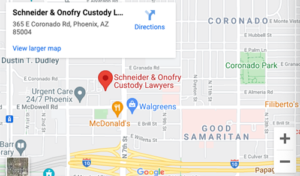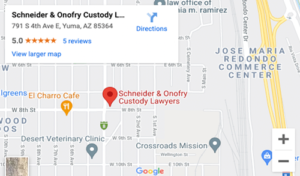Alimony Lawyers in Phoenix, Arizona

During divorce processes, it is important for separating spouses to maintain fiscal stability as they divide property and change living situations. Alimony is the court-ordered provision of spousal support to maintain financial stability after a divorce and is dependent on multiple individual case factors. Consultation with experienced Phoenix alimony attorneys at Schneider & Onofry, P.C. can reduce anxiety for divorcing parties who require financial support from their spouse.
When is it possible to receive alimony after my divorce in Phoenix AZ?
In the State of Arizona, a spouse may file for spousal support or an alimony order if he or she does not have enough to provide for reasonable needs, is unable to be self-sufficient through attainable employment avenues, or lacks skills to be self-sufficient, or is unable to work outside of the home due to child care responsibilities. The maintenance order is usually filed by the divorcing spouse who needs financial support, and the court may grant it based on a variety of factors that will determine the amount and length of time it will be required. Consideration will be given to:
- Standard of living established throughout the relationship and marriage;
- How long the individuals have been married;
- Age of divorcing parties;
- Employment and earning ability;
- Physical and emotional health.
The same considerations are also given to the spouse that will be required to pay alimony, and figured into their ability to maintain their lifestyle while supporting the spouse in need of financial assistance. Contributions of the spouse seeking assistance to the earning ability of the other spouse can also be a factor in the determination of alimony, specifically if one spouse gave up their career to attend to the home, and children.
How long can a spouse receive alimony?
Arizona family court judges will review the particulars of a divorce case to determine the amount and duration of time that alimony should be provided to a spouse after divorce proceedings. Alimony length is usually based on the length of the marriage and is specific to each case and judge. Alimony can be discontinued when a person remarries, or lives with another person although there are cases when a judge may award permanent alimony. It is best to consult with an experienced Phoenix alimony lawyer at Schneider & Onofry, P.C. who can guide the legal actions in the best interests of their clients who are dependent on alimony to maintain the same quality of life they had while married. Marital fault is not a consideration to determine the payment of alimony.
What types of alimony are available?
An experienced spousal maintenance attorney in Phoenix Arizona at the Law Offices of Schneider & Onofry, P. C. can explain the differences in the types of alimony as pertains to your divorce action in the State of Arizona. This may have some bearing on the judge’s decision regarding the length of time alimony will continue and the amount that should be paid. A permanent, or continuous award for spousal maintenance is one that has no ordered termination date. This type of alimony is ordered when one of the spouses is too old to be reasonably expected to enter the workforce or is suffering from a disability that reasonably prevents them from working. For the bulk of dissolutions, the spousal maintenance order and length is designed to allow for a transition by the receiving spousal to become self sufficient.

Does child custody in Phoenix impact alimony payments?
Custodial parents may receive higher alimony payments, but the judge in the state of Arizona has discretion over alimony calculations. Skilled legal counsel at Schneider & Onofry, P.C. can guide actions by parties requesting alimony and work with the family law courts to prove that the individual requesting the spousal support needs it to maintain financial stability as they raise the children from the broken marriage. Spouses who have children may benefit from maintaining a respectful understanding of each other’s financial needs and their mutual agreement on alimony may save them from the aggravation of growing legal fees and court appearances. Talk to legal counsel about mediation and how the process may be beneficial to both parties.
Is alimony discontinued if one spouse moves out of state?
Obligation to pay.
Under Article IV of the United States Constitution, all states are obligated to give full faith and credit to judicial proceedings in other states, including actions for Arizona divorce proceedings and conditions surrounding payment of alimony in Phoenix Arizona. The paying spouse must continue to fund the ex-spouse who moves out of state, and the re-locating spouse is still afforded the right to act when there is a lapse in payment, or payments stop all together by the paying spouse. A spousal support attorney can assist with the preparation of legal documents that may be filed for the benefit of the relocated ex-spouse when there are problems with the payment of alimony.
Conversely, if the ex-spouse who is paying alimony moves out of the state, the receiver of alimony must immediately register the alimony in the state where the paying ex-spouse now resides. Talk to an alimony attorney in Phoenix AZ about the paperwork that will need to be filed to protect your financial interests.
Foreign alimony award.
Access the court where the paying spouse has moved, and request “foreign” alimony award paperwork. There should be a wage withholding form for garnishment to deduct alimony from the delinquent ex-spouse’s paycheck if that becomes necessary. A Phoenix alimony lawyer can assist with access to the forms that will need to be accompanied by an original copy of the alimony order from the divorce court and copies should be provided to the last known address of the ex-spouse responsible for payments. In some cases, it is best to hire a private process server, or the county sheriff to make certain that the ex-spouse is aware of their obligation and that action is being taken to garnish their wages if they do not willingly pay the alimony that is due.
Hearing.
Depending upon the state that the paying ex-spouse relocated to, the registration of alimony and confirmation may be a two-step process involving a hearing in court. After the spouse receiving alimony files for a registration, the paying ex-spouse will be notified. They may want to request a hearing at that time. If a hearing is not formally requested, the alimony registration is automatically confirmed and actions for wage garnishment can be initiated.
If a hearing has been agreed to by the courts, the ex-spouse may try to argue that the alimony order is no longer legitimate and proof of past alimony payments may be needed to prove to the court that alimony is required and was agreed upon by the relocated ex-spouse.
Refusing to pay.
When an ex-spouse deliberately refuses to pay, it can be difficult to force them, and wage garnishments only work if the ex-spouse is employed. When this occurs a contempt action may be necessary to file with the courts.
Contempt action.
Record keeping will be important to a contempt action, so ex-spouses who are receiving alimony should record dates and amounts of alimony that have not been paid. If there was any correspondence to the ex-spouse who is supposed to be paying the alimony, through email, phone, or letters, that correspondence may be needed by the court to prove that there was no payment even after legitimate attempts to contact the paying spouse.
- If a withholding order is in place and you still have not received any payment, the ex-spouse may be deliberately refusing to work.
- It can be difficult to get them to pay, but a Phoenix alimony attorney working on your behalf can ask the court to find the paying ex-spouse in “contempt” of the alimony order from the divorce.
A Phoenix Arizona alimony law firm can assist with this type of action toward the goal of recovery alimony payments even after an ex-spouse has left the state where the divorce and alimony order was filed.
Are alimony payments taxed?
Due to changes recently in the tax laws, spousal maintenance is no longer taxed to the recipient or deductible to the paying spouse. However, it is recommended you check with your tax preparer as to your circumstances.
Spousal Support (Alimony) Litigation in Phoenix Arizona.
Our Phoenix alimony attorneys at the Law Firm of Schneider & Onofry will guide divorcing parties through the process of identifying instances when alimony is required, the type of alimony necessary, and the length of time it will be required. Consultation with an attorney who has experience with Arizona Family Courts will benefit divorcing parties who need spousal support to maintain a post-marriage lifestyle.
Sources:
https://azleg.gov/ars/25/00319.htm
















